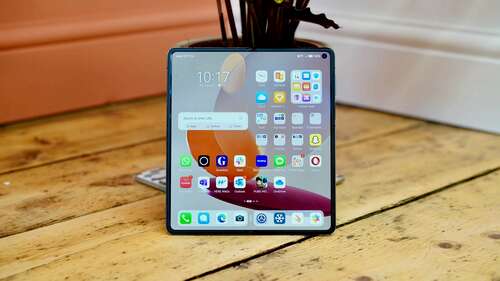Looking to try something a little different with your next phone upgrade? Then chances are you may want to check out foldables, a new-ish category of smartphones that come with clever folding screens.
But which to get, and can you trust that the screens will last? Sadly, the answer is, not always. Based on our experience using every foldable we could get our hands on since the original generation Galaxy Fold, we can confirm while folding screens are cool, not all of them offer the best user experience.
Whether it’s a nifty folding clamshell like the Motorola Razr 40 Ultra, or a phone-come-tablet like the Samsung Galaxy Z Fold 5, foldable tech is still relatively young and, as such, comes with a few quirks.
These can range from apps not displaying correctly due to the device’s screens’ atypical aspect ratios (usually a problem for book-style foldables, though strides have been made here in recent years) to quality issues that make it all too easy to break the devices with surprisingly little effort.
This is why we’ve yet to give any foldable the coveted 5-star review when we’ve had them in for testing and a key reason we recommend most buyers opt for a traditional flagship – though a couple of 2024 entries have come close. You can see a selection of some of the most impressive we’ve tested in our best iPhone, best Android phone and best phone buyers’ guides.
However, if that doesn’t put you off and you won’t bend to our advice, keep reading. In this list, we’ve detailed the top-performing foldables we’ve tried and tested.
Best foldable phones at a glance
How we test
All the phones included in our Best foldable phone list have been thoroughly tested and used by one of our expert reviewers.
We don’t review phones of any type based purely on benchmark scores or marketing hype. We use them as our everyday device for the review period, which is usually at least five days but can often be a lot more if the device requires it.
Whenever you read a phone review published on Trusted Reviews, you should be confident that the reviewer has put their personal SIM card into the phone, synced across their most-used apps and logged into all their typical accounts. We do this so you’ll feel confident in our review and trust our verdict.
Our review process includes a mixture of real-world tests, along with more than 15 measured tests and industry-standard benchmarks. We believe this gives the most rounded view of a device.
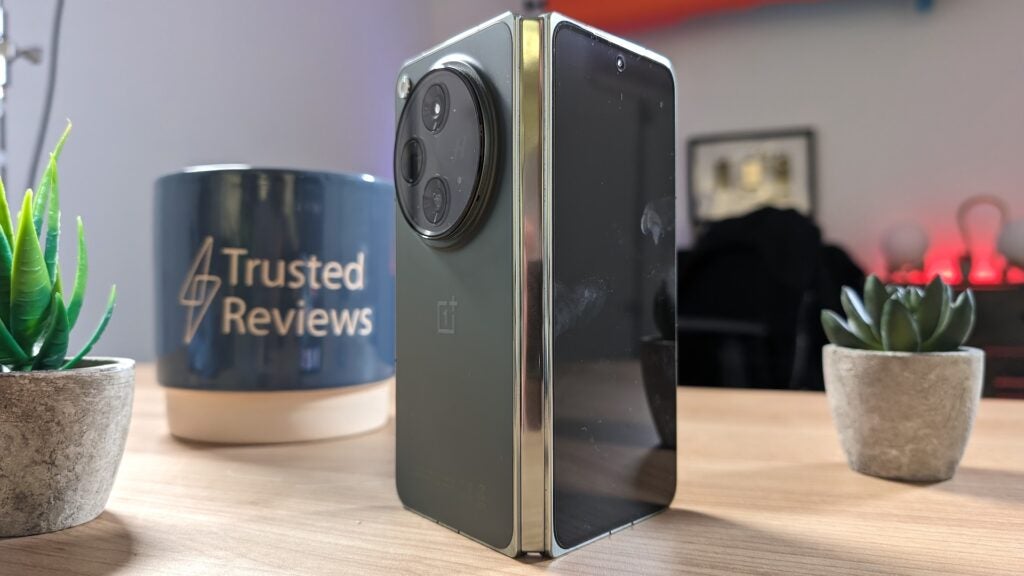
OnePlus Open
The best book-style foldable
Pros
- Solid foldable hardware with minimal display crease
- Custom foldable camera tech
- Unique Open Canvas multitasking software
- True fast charging capabilities
Cons
- IPX4 water resistance isn’t the best
- Still hefty at 245g
If you’re the hunt for a book-style foldable smartphone in 2024, you’ll find no better than the OnePlus Open.
The OnePlus Open fixes a long-time complaint of book-style foldables; the cover display. While the likes of the Z Fold 5 and Pixel Fold offer a tall-and-narrow and short-and-squat cover display respectively, the OnePlus Open sports a regular 6.3-inch 20:9 display with all the premium bells and whistles you’d expect from a flagship display, including an adaptive 120Hz refresh rate, impressive peak brightness of 2800nits and a pixel-packed resolution.
This all means there’s no compromise using the cover display in place of the larger internal one for anything from replying to texts to casually scrolling on Instagram.
Of course, it’s all about the foldable inner display, and OnePlus has knocked it out of the park here too. There’s a much shallower central crease than the competition, so much so that it’s hard to see unless you’re looking at it off-angle, and there’s barely any change in tactile feedback as you run your finger over it. That means that the 7.86-inch OLED panel is an absolute joy to use, further improved by OnePlus’ unique Open Canvas multitasking software that lets you use three apps in full-screen mode with ease.
That stellar performance continues with the camera setup, boasting a trio of rear lenses that, unlike the competition, are all designed specifically for use in foldables. That translates to strong performance from not only the 48MP primary and ultrawide sensors, but the 64MP periscope lens in particular, delivering great shots at 3.5x, 6x and although images are pretty terrible at the full 120x, it does a good job up until the 25x mark.
Throw in strong performance from the Snapdragon 8 Gen 2, fast 67W SuperVOOC charging with a charger in the box and OnePlus’ signature volume slider and you’ve got a very tempting book-style flagship that costs less than others on the market at £1,599 – it’s just a shame it’s not readily available on contract in the UK, making it a hefty upfront purchase.
Reviewer: Lewis Painter
Full review: OnePlus Open review
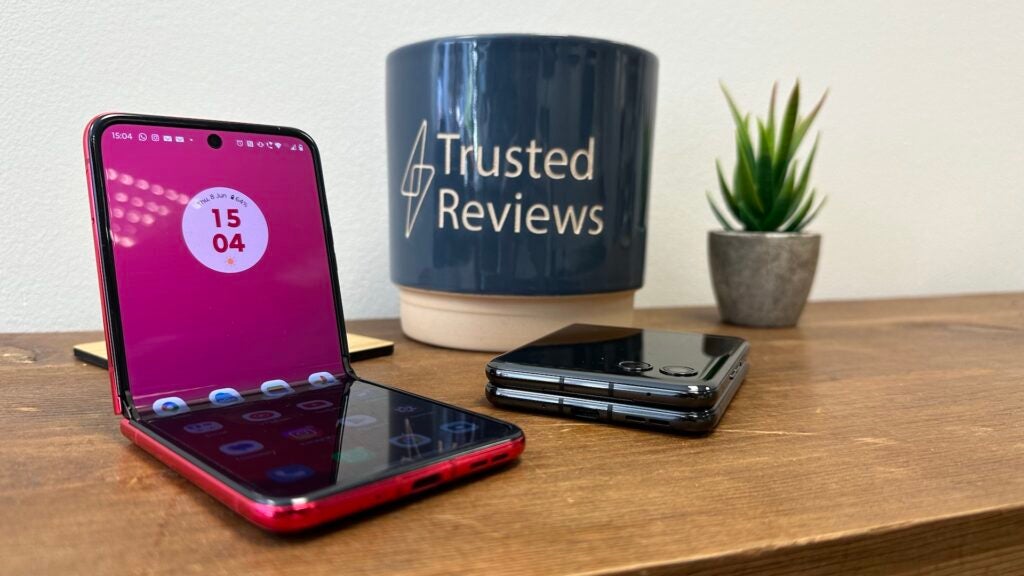
Motorola Razr 40 Ultra
The best clamshell foldable
Pros
- Premium clamshell foldable design
- Genuinely useful 3.6-inch exterior display
- Great camera performance from main 12MP sensor
- Top-end 6.9-inch pOLED foldable display
Cons
- Battery could only last about a day
- Snapdragon 8+ Gen 1 is a year old
If you’ve got your heart set on a clamshell-style foldable, the Motorola Razr 40 Ultra should be of serious consideration. The Razr 40 Ultra takes the clamshell experience to the next level with a large 3.6-inch pOLED exterior display with a super-smooth 144Hz refresh rate.
The display is large enough not only to run widgets like the Samsung Galaxy Z Flip 5 but any Android app you like, allowing you to control smart home tech, reply to incoming messages and get directions from Google Maps having to unfold the display. It not only cuts down on how often you’ll have to open the phone, but the folded form factor makes it comfortable to use too.
That’s not to say that you’ll always be using the external display, especially with a tall, narrow 6.9-inch pOLED display found within. It’s super smooth at 165Hz, and boasts LTPO tech that allows it to intelligently adapt the refresh rate depending on what you’re doing. The catch is that you can’t force that top-end 165Hz refresh rate, so it’ll only be available when the phone deems it useful.
The Razr 40 Ultra’s hinge also allows for a near-gapless fold that reduces dust ingress, an improvement on the older Razr (2022), and also manages to reduce both the visibility and the tactile feel of the crease on the inner display.
The 12MP main camera may not sound that impressive on paper but paired with OIS, PDAF and a wide f/1.5 aperture, it excels both in well-lit and low-light environments. It’s still not quite on par with top-end flagships, but it’s impressive for a slimline foldable and beats the dual 12MP offering of Samsung’s Z Flip 5.
The phone is powered by the year-old Snapdragon 8 Plus Gen 1, which may put some off, but everyday performance is solid. It does tend to overheat when playing graphics-intensive games, however.
The 3,800mAh battery is an improvement on the Razr (2022)’s 3,500mAh cell and it’s capable of lasting all day, though it won’t make it that long into the second. It’s a good thing it charges in less than an hour with 30W fast charging tech.
Reviewer: Lewis Painter
Full review: Motorola Razr 40 Ultra review
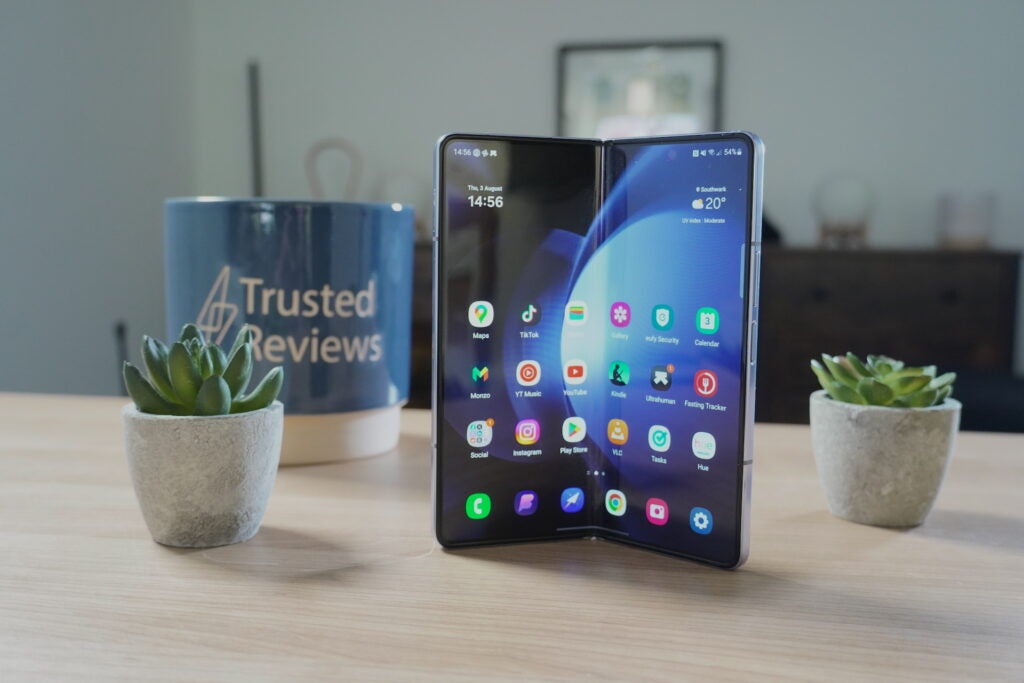
Samsung Galaxy Z Fold 5
The best performance
Pros
- Large 7.6-inch foldable display
- Most powerful foldable phone around
- Better app support than other book-style foldables
Cons
- Very similar to the Samsung Galaxy Z Fold 4
- £100/$150 price increase
- Identical camera setup
Samsung continues to dominate the foldable market in 2024 despite increased competition from the likes of Oppo, Motorola, Google and others.
Samsung’s latest edition of its flagship foldable – the Z Fold 5 – is the finest one we’ve reviewed to date, though it’s certainly a year for refinement. It’s very similar to the top-end Z Fold 4 from last year, boasting the same general design, cameras, battery life and charge speeds, but there are key improvements including a redesigned hinge that finally allows the Fold 5 to close completely with no awkward gap.
It also boasts the top-end custom Snapdragon 8 Gen 2 for Galaxy chipset that makes it, along with the Flip 5, the most powerful foldables around right now, making light work of high-end gaming, split-screen multitasking and just about anything else we could throw at it during testing.
As ever, there are two OLED displays here, a smaller 6.1-inch outer panel and a larger 7.6-inch internal one. While there’s minimal change in terms of hardware, Samsung has done an admirable job at convincing developers to add support for the boxy aspect ratio, with previously-missing entries like Instagram now available in all its full-screen glory. It’s a stark change to the hit-and-miss experience on offer from the Google Pixel Fold.
The 4400mAh battery remains just about enough to comfortably get through a day without scrambling for a charger, though with 25W charge speeds, it could be faster.
Reviewer: Lewis Painter
Full review: Samsung Galaxy Z Fold 5 review
Google Pixel Fold
Best camera
Pros
- Thin when folded and unfolded
- Some of the best foldable cameras around
- Pixel software is unmatched
Cons
- Very visible crease on inner display
- Odd approach to app support
- Very expensive
It’s finally here, Google’s first foldable phone. The Google Pixel Fold sees the big tech brand jump on the folding device bandwagon, and there is a lot to like.
Google has come close to nailing the design with its first folding phone, offering a combination of displays that makes it ideal for use in many scenarios. The 5.8-inch screen on the outside is more than large enough to accommodate regular phone use, while it opens up to reveal a 7.8-inch display that offers a more expansive canvas but without feeling awkward to navigate.
The handy choice of displays is matched by the remarkable thinness of this phone, which makes it comfortably pocketable. At just 5.3mm when unfolded, and 12.2mm folded, it’s impressively portable. It’s a tad frustrating that it doesn’t naturally fold completely flat, but that won’t really affect your day-to-day.
Aside from the exciting folding design, you get a typically strong Google Pixel experience across the board. And, that includes the camera. The main 48MP camera offers versatility, when you need a great shot at a pinch, while the 10.8MP 5x telephoto lens is easily one of the most impressive lenses on a foldable. The telephoto deftly enables crisp close-ups and refreshing accurate bokeh effects.
Reviewer: Lewis Painter
Full review: Google Pixel Fold review
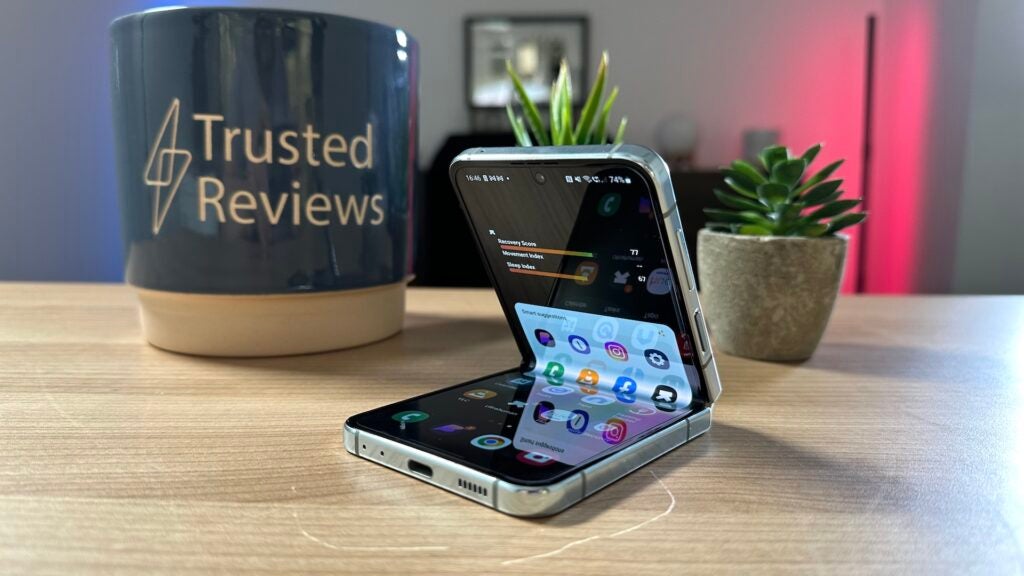
Samsung Galaxy Z Flip 5
The best foldable for water resistance
Pros
- Premium look with no gap when folded
- Powerful Snapdragon 8 Gen 2 for Galaxy chipset
- Much more useful 3.4-inch cover display
Cons
- Same 12MP cameras as Z Flip 4
- Middling battery life, even for a foldable
- Cover display software is surprisingly limited
If you’re in the market for a foldable with decent water resistance, your options are admittedly limited to the book-style Samsung Galaxy Z Fold 5 and its clamshell sibling, the Galaxy Z Flip 5, with both boasting IPX8 water resistance that should protect them from being submerged in 1m of water for up to 30 minutes.
Compared to last year’s Z Flip 4, the Z Flip 5 sports a much-improved cover display experience. It’s now larger at 3.4 inches, taking up much of the exterior panel of the foldable, and brings with it new functionality. There’s a new range of widgets designed for the display, along with support for apps, though the app support is painfully limited (only 6 are supported at the time of writing) compared to the Razr 40 Ultra, limiting just how useful it can be.
Improvements to the waterdrop hinge allow the Z Flip 5 to close completely flat for the first time, allowing it to shave a couple of millimetres from its folded form factor, making it a little more pocketable than before. It’s also absurdly powerful with the same custom Snapdragon 8 Gen 2 for Galaxy as the Z Fold 5 that makes it comfortably more powerful than any other clamshell on the market right now.
But while these improvements are welcome, it’s not a complete redesign. The dual 12MP sensors on the lid remain essentially unchanged for the second year in a row, and while they’re perfectly capable snappers, they’re beginning to look a little dated compared to other foldable camera setups.
Battery life could also be better, matching the Z Flip 4’s 3,700mAh cell though with a much larger exterior panel to power this time around. It could still get us through a day, but only with about 5-15% left in the tank. That’s a little too close for comfort.
Reviewer: Lewis Painter
Full review: Samsung Galaxy Z Flip 5 review
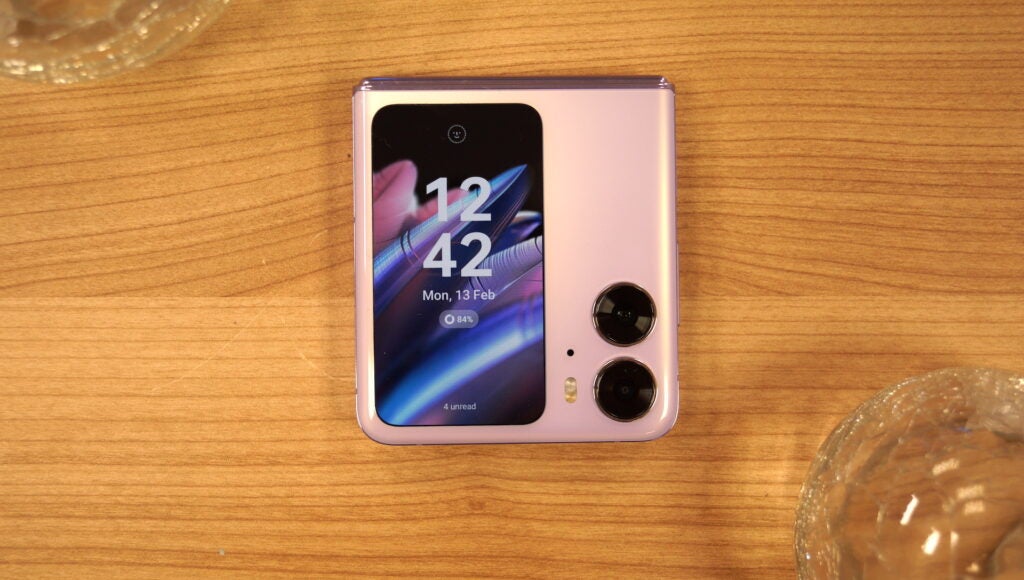
Oppo Find N2 Flip
Most affordable clamshell foldable
Pros
- Most affordable clamshell foldable around
- Gapless folding mechanism
- All-day battery life
- Versatile folding form factor
Cons
- Performance isn’t quite flagship-level
- Less water resistant than rivals
- Software needs some tweaks
- Foldable display can be a fingerprint magnet
The Oppo Find N2 Flip is a foldable that looks to offer it all without the expected price tag, coming in at a rather tempting £849.
Like more premium foldables, the Find N2 Flip can close completely flat with no gap. This protects the inner display from dust and other debris from your pocket while making it look more premium than Samsung’s option.
There’s also a large 3.45-inch cover display that not only provides a full camera preview compared to cropped previews from other foldables, but the ability to access widgets specifically designed for Oppo’s cover display. This makes it far more useful, meaning you’ll have to unfold the phone less often, though it’s not quite as capable as the Razr 40 Ultra’s external panel.
While on the subject of the fold, it’s worth noting that the Find N2 Flip has a pretty decent hinge mechanism with a new Flexion hinge that reduces the crease by up to 60% compared to the already-impressive original Oppo Find N. The end result is a crease that’s barely visible when looking straight on, and there’s only a slight change in sensation as you run your finger over it.
There’s also a decent camera offering comprised of a main 50MP snapper and an 8MP ultrawide, and the ability to shoot in 4K@60fps is handy too, especially in the phone’s special camcorder mode.
Throw in top-level performance from a Dimensity 9000+, a 4300mAh battery that provides true all-day battery life and a cheaper price tag than competing clamshell foldables and you’ve got a very tempting clamshell phone.
Reviewer: Lewis Painter
Full review: Oppo Find N2 Flip review
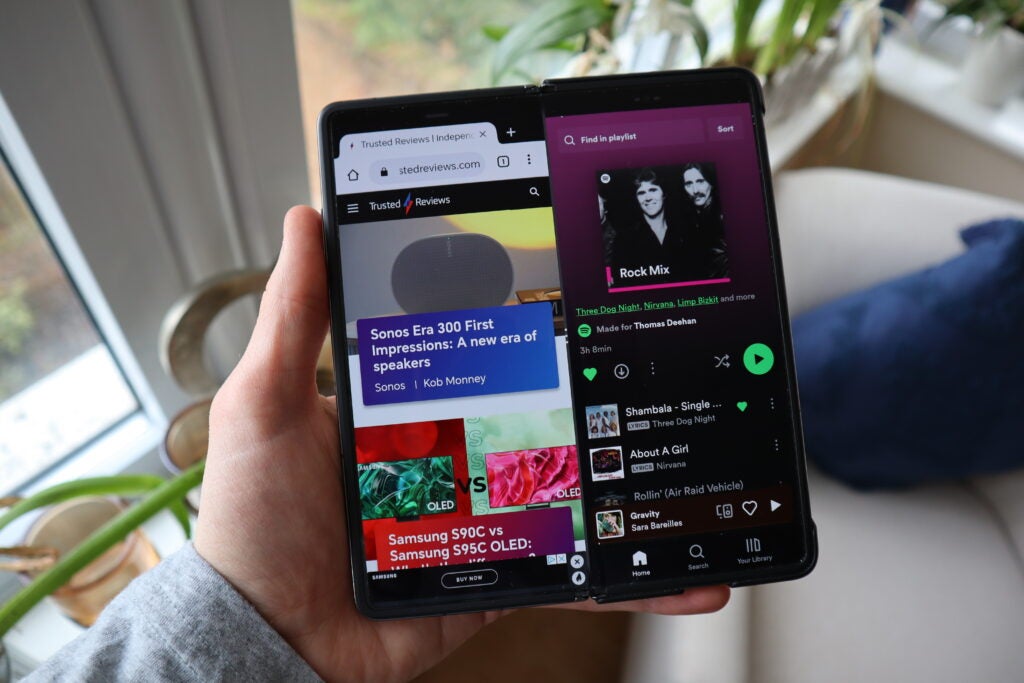
Honor Magic Vs
Most affordable book-style foldable
Pros
- Gapless fold
- Gorgeous eye-catching finish
- Big battery
Cons
- Only 90Hz refresh rate on internal display
- App support still an issue
- Not the latest Qualcomm chipset
Competing directly with the Samsung Galaxy Z Fold 4, and now the Z Fold 5, the Honor Magic Vs has its sights set on being the best book-style foldable on the market without the truly premium price tag from the likes of Samsung and Google.
The Magic Vs comes packed with a slender 6.2-inch outer display and an impressive 7.9-inch display on the interior. Both displays are larger than what the Z Fold 5 has to offer, something that really helps to maximise the potential of the foldable form factor.
For instance, the larger 7.9-inch display is perfect for watching content and it’s large enough to make multitasking a breeze. Plus, if you’ve ever found yourself cursing that onscreen keyboards are just too small to avoid making typos, then you’ll really appreciate the added real estate on the larger display which makes note-taking so much easier.
Thanks to the Snapdragon 8 Plus Gen 1 chipset inside the Honor Magic Vs, multitasking works really well, and we didn’t pick up on any noticeable slowdown when running two apps at the same time, though it’s not quite as powerful as the Snapdragon 8 Gen 2 for Galaxy within the Z Fold 5.
Unfortunately, the Magic Vs is held back by the fact that plenty of apps have yet to be optimised to make the most of the foldable format – an area where Samsung excels – and Honor’s very-own MagicOS throws a little too much bloatware into the mix which cannot be deleted from the phone itself.
Still, the massive 5000mAh battery can see you safely to the end of each day without worry and under modest use, you can even expect to run through two days on a single charge. It’s also worth mentioning that the Magic Vs only comes in one high-specced 512GB option with 12GB RAM to boot. If you’re after an alternative to Samsung’s foldable then the Magic Vs is a great place to start.
Reviewer: Thomas Deehan
Full review: Honor Magic Vs
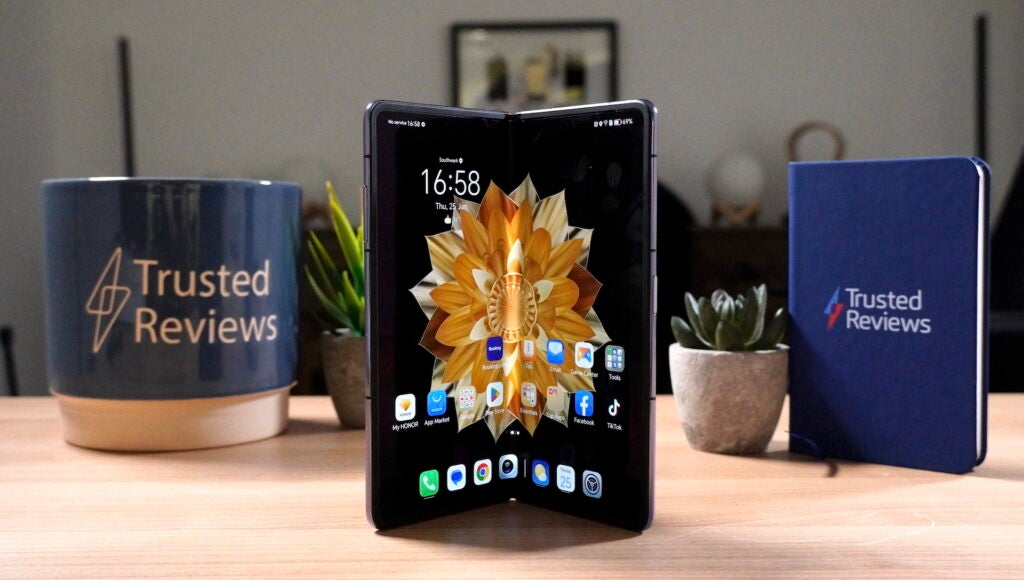
Honor Magic V2
The thinnest book-style foldable
Pros
- Incredibly thin and light foldable design
- Near-invisible inner crease
- All day battery life and fast charging
Cons
- Not the latest processor
- £300 more than the Magic Vs
- MagicOS could be more customisable
If you’re looking for a mammoth battery and fast performance housed in the thinnest and lightest book-style foldable to date, then the Honor Magic V2 is the handset for you.
With a folded thickness of just 9.9mm and dropping to just 4.7mm when unfolded, the Magic V2 is closer in width to standard smartphones than any other foldable that’s currently available. In addition to its slick build, it weighs just 231g, making it super lightweight. It actually weighs less than the Samsung and Google’s foldables, as well as the Samsung Galaxy S24 Ultra.
Despite its incredible thinness, the Magic V2 boasts a total battery power of 5,000mAh, in the form of two super slim battery cells. Our benchmark tests showed that 60-minutes of Netflix streaming resulted in just an 8% battery discharge. When you do eventually need to recharge, the 66W fast wired charge gets you from 1-100% in just under an hour.
As a book-style foldable, the Magic V2 has two displays, a cover display and a larger internal panel. The 6.43-inch cover display resembles a regular smartphone display and even boasts a peak brightness of 2500nits, making it perfect for viewing in bright sunlight.
Equally the OLED display of the 7.92-inch internal screen allows users to perform a variety of tasks, including split-screen multitasking, seamlessly. Although there’s yet to be a perfect foldable crease in the market, the Magic V2 does boast a very shallow internal crease, making any screen interruption minimal.
The Magic V2 also runs on the Snapdragon 8 Gen 2 processor, which, even despite being supplanted by a newer chip, is still more than sufficient for daily use. Perhaps more surprising is the fact the V2 is powered by Android 13 rather than the newer Android 14, which is already being rolled out in new smartphones. Again, this doesn’t necessarily affect the performance and ability of the Magic V2, but it’s worth noting that it’s technically not as proficient as a truly up-to-date smartphone.
The Magic V2 also boasts three high-res cameras, including a 50MP main camera, 50MP ultrawide and a 20MP 2.5x telephoto lens with digital zoom up to 10x. This lens trio offers a higher megapixel count than alternatives from Google and Samsung too, although the OnePlus Open does technically beat the Magic V2 on resolution.
Reviewer: Lewis Painter
Full review: Honor Magic V2
FAQ
Apple hasn’t released or announced any intention to make a foldable phone yet, however rumours swirl that we’ll see a big play for this category from the Cupertino company in the coming years. For now, all the best foldable phones run on Android.
We also considered…
Spec comparisons
These are all powerful phones, with good specs. For pure spec-power though, the Z Fold 5 comes out on top.
UK RRP
USA RRP
EU RRP
CA RRP
AUD RRP
Manufacturer
Screen Size
Storage Capacity
Rear Camera
Front Camera
Video Recording
IP rating
Battery
Wireless charging
Fast Charging
Size (Dimensions)
Weight
ASIN
Operating System
Release Date
First Reviewed Date
Resolution
HDR
Refresh Rate
Ports
Chipset
RAM
Colours
Stated Power
Test data
You can see a detailed breakdown of all the test data we collected reviewing the phones in this list in the table below.
Geekbench 5 single core
Geekbench 5 multi core
Geekbench 6 single core
Geekbench 6 multi core
Max brightness
1 hour video playback (Netflix, HDR)
30 minute gaming (intensive)
30 minute gaming (light)
Time from 0-100% charge
Time from 0-50% charge
30-min recharge (included charger)
15-min recharge (included charger)
30-min recharge (no charger included)
15-min recharge (no charger included)
3D Mark – Wild Life
3D Mark – Wild Life Stress Test
GFXBench – Aztec Ruins
GFXBench – Car Chase
